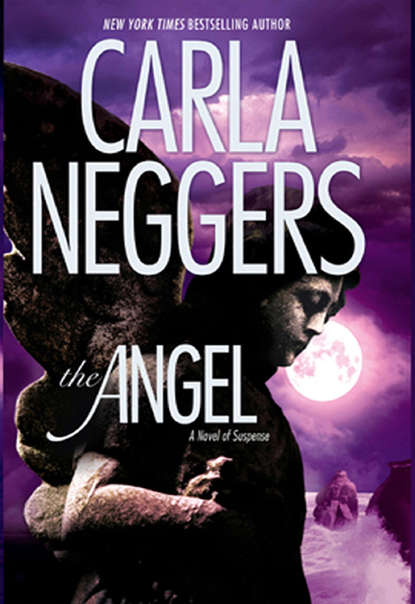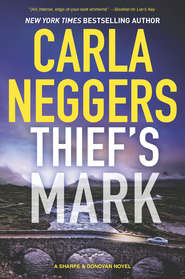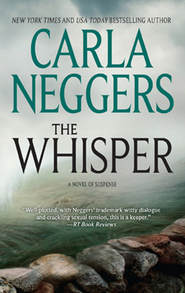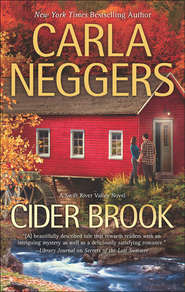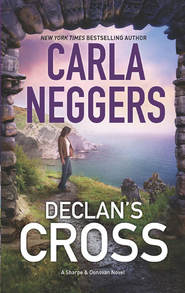По всем вопросам обращайтесь на: info@litportal.ru
(©) 2003-2024.
✖
The Angel
Автор
Год написания книги
2019
Настройки чтения
Размер шрифта
Высота строк
Поля
“You bid on my painting? Why?”
He shrugged. “Why not?”
Keira didn’t answer. He was obviously a man who could charm his way into or out of anything. And he made her uncomfortable—no, not uncomfortable…self-conscious. Aware. Maybe it was because he was the first person she’d spotted when she’d arrived from the Public Garden. Some kind of weird imprinting that was inevitable, unavoidable.
Finally, she said, “You don’t care about a painting of an Irish cottage.”
“I care. I just didn’t bid on it for myself. Abigail wanted it, but she was going to lose out. I decided it’d be a nice wedding present for her and Owen. He’ll like it because she likes it.” The corners of Simon’s mouth twitched with amusement. “Don’t frown. He thinks you’re good, too.”
Not only, Keira thought, was Simon dangerously charming, but he was also observant. And frank. “Thank you for bidding on the painting. The proceeds from the auction will be put to good use. You’re not from around here, are you?”
“Not really.”
“Then where do you live?”
“Direct, aren’t you? I have a boat. It’s at a pier in East Boston at the moment, but it’s only been there since yesterday. Before that, it was in Maine. I met Owen and some other Fast Rescue people at his place on Mount Desert Island after our mission to Armenia.”
Keira had read about the devastating earthquake. “That must have been tough.”
“It was.” He didn’t elaborate. “I was in London when it happened. I go back tomorrow.”
“What’s in London?”
“The queen. Castles. Good restaurants.”
The man had an appealing sense of humor, and, in spite of the tension of the past few hours, Keira felt herself relaxing. “Very funny. I meant what’s in London for you?”
“I’m visiting a friend. What about Ireland? What’s there for you, besides angels and fairies?”
Answers, she thought, but she shrugged. “I guess I’ll find out.”
His eyes narrowed on her, and she noticed they were a vivid, rich shade of green. “Up for a bit of adventure, are you?”
“I suppose I am.”
“Have a good trip, then.”
He ambled off down Beacon Street. When she returned to the drawing room, Keira checked with Colm. “How much did my cottage painting go for?”
“Ten thousand.”
She couldn’t hide her surprise. “Dollars?”
“Yes, dollars, Keira. It was four times the highest bid. Simon Cahill bought it. Do you know him?”
“No, I just met him tonight. What about you?”
“I talked with him for all of thirty seconds. Well, he must want to support the conference.”
“He must. I’m grateful for his generosity.”
“As am I,” Colm said.
Keira said good-night and headed for the stairs up to her apartment, amazed at how Simon had managed to get under her skin in such a short time.
It had to be because of the intensity of the past few hours. What on earth did they have in common?
She’d be back to normal by morning, finishing up her packing and heading to the airport by evening. At least she wasn’t going to Ireland by way of London; there was no risk they’d be sitting next to each other on the same flight.
It was a long way across the Atlantic.
Chapter 5
Boston Public Garden
Boston, Massachusetts
10:00 p.m., EDT
June 17
Abigail Browning paced on the sidewalk along the edge of the man-made pond where the two college students had discovered the body of Victor Sarakis, a fifty-year-old resident of Cambridge who apparently, even according to the initial take of the medical examiner, had drowned in about two feet of water.
Normally, Abigail found the Public Garden a soothing, pleasant place to be, with its graceful Victorian walks and statues, its formal flower beds and labeled trees, its mini suspension bridge over the curving pond. Technically, it was a botanical garden—a refuge in the heart of the city of Boston.
Tonight, it was the scene of a bizarre, as yet unexplained death. Police lights and the garden’s own Victorian-looking lamps illuminated the scene as detectives, patrol officers, crime scene technicians and reporters did their work. By tomorrow morning, there would be virtually no sign of what had gone on here tonight. The swan boats, a popular Public Garden attraction for over a century, could resume their graceful tour of the shallow water.
Abigail stopped pacing, grateful, at least, that she’d worn flats to tonight’s reception. Trees, flowers and grass were still dripping from the downpour. Most likely, it had been raining, and raining hard, when Victor Sarakis ended up in the water. The medical examiner had already removed the body for an autopsy. Anything was possible. Heart attack, stroke, an unfortunate slip in the heavy rain.
Pushed, tripped, hit on the back of the head.
Abigail wasn’t ready to jump to any conclusions.
She glanced sideways at Bob O’Reilly, who’d decided, on his own, to interview the two students. Reinterview, Abigail thought, irritated. The responding officers had talked to the students. She’d talked to them. Now Bob was talking to them. For no good reason, either, except that he was a senior detective with decades of experience on her and presumably knew what he was doing. But she wished he’d go back up to Beacon Street and listen to his daughter play Irish music.
The students—summer engineering students from the Midwest—looked worn out. They could have gone back to their dorm a long time ago—they just didn’t.
They’d told Bob the same story, about cutting through the Public Garden from a bookstore on Newbury Street, hoping to beat the storm and get to a friend’s apartment on Cambridge Street. When the skies opened up on them, they debated going back to the bookstore or pushing on to their friend’s place.
Then they’d spotted a body in the pond.
“You could tell he was dead by looking at him?” Bob gave them one of his trademark skeptical snorts. “How?”
“I don’t know,” the thinner of the two students said. He had a scraggly beard and was shivering as his wet clothes dried in the breeze. “It was obvious.”
“He didn’t look like he’d been in the water that long,” his friend said. He was meatier, and he’d gotten just as wet, but he wasn’t shivering.
“Long enough,” Bob said.





